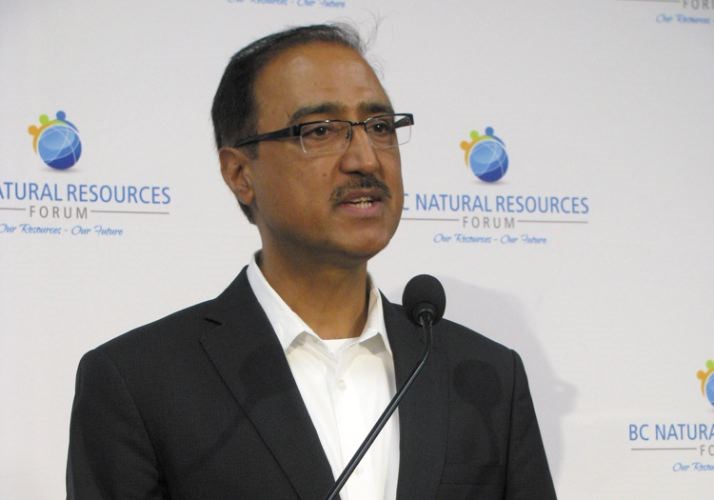Three envelopes of money were handed out Wednesday from the federal government to First Nations in the northern region of the province.
The funding was given to Aboriginal economic development projects that would help develop close-to-home jobs and solve some close-to-home problems within some rural communities. Each of these projects exhibited a technological advancement on behalf of local living.
The innovation word was the theme of the B.C. Natural Resources Forum held in Prince George and attended by federal Minister of Natural Resources Amarjeet Sohi.
"No relationship is more important than the one we have with Indigenous peoples," said Sohi, as the money was announced. "Central to that is supporting economic development and respect for the environment. Today I am delighted to confirm three important investments. All of them were for initiatives that touched on innovative, grassroots First Nations projects."
The projects were:
- $475,000 for Chu Cho Environmental to support an Indigenous bioheat project in Tsay Keh Dene Nation. The funding will enable Chu Cho Environmental - a company owned by the Tsay Keh Dene Nation - to assess the feasibility of using biomass to generate heat and power. Once completed, this project would be among the first of its kind to heat and power an Indigenous community in the province, demonstrating the power of innovation to create opportunities in a remote community.
- $64,629 for the Witset First Nation to support equipment upgrades, help train workers and enable new developments at the Kyahwood Forest Products facility located in Witset. This project was funded through Natural Resources Canada's Indigenous Forestry Initiative (IFI), which facilitates economic development in Indigenous communities that rely on forests. The initiative is a featured component of Canada's Softwood Lumber Action Plan.
- $50,000 for Tzah Tez Tlee Development Corporation in Fort Babine to help launch a feasibility study on a biomass heating system using excess wood residues from the mill to reduce the community's reliance on diesel and help it transition to a low-carbon economy. This opportunity was funded through the IFI and the Strategic Partnerships Initiative.
Sohi said these projects were homegrown solutions to each of these communities' unique circumstances. The funding was important in the overall goal of "providing Indigenous communities with the support they need to build the future they want."
Mike Tilson, the general manager of Chu Cho Environmental, was at the forum to receive the funds on behalf of the First Nation located north of Prince George in the rural far reaches of Williston Lake. It is so remote it is off the provincial power grid, much of which is generated at the other end of the lake. With more than 10 years of experience working in the Tsay Keh Dene community, Tilson said, "I've watched more than 10 million litres of diesel trucked north and burned in large diesel generators for electric power. The irony is, of course, the community is located beside the largest battery in Canada, the Williston Reservoir. And yet Tsay Keh must burn expensive diesel power, for which they pay premium rates. This irony extends further, as this very reservoir created in 1968 displaced Tsay Keh Dene people, many of whose homes and cabins are now under 300 feet of water.
"The Tsay Keh Dene Nation is forward looking and has proposed a sustainable solution
that represents a shift in the energy landscape of our remote community, and that will completely delete diesel consumption in the community," Tilson added. "Biomass creates jobs. Rather than burn the jobs as diesel fuel, we are creating jobs and a sustainable future."
Stan Morris, manager of Kyahwood Forest Products in the Witset First Nation, said the funding coming to his project in Witset (formerly Moricetown) would provide an important add-on to an already operational factory working in their community.
"This funding allowed Kyahwood Forest Products to add a dunnage and lath machine to the facility," he said. "This will enable Kyahwood to produce its own product for the finger-joint lumber we produce, rather than getting it elsewhere. In turn, this saves the company approximately $16,000 to $20,000 per year plus adding four permanent jobs, and any excess dunnage/lath produced can be sold on the open market, further increasing our revenue."
Richard C. Braam, general manager of Tzah Tez Tlee Development Corporation, said his project was based in remote Fort Babine located north of Smithers.
"The community is located in the middle of several active forest operations that leave biomass piles that are burned annually," he said. "This project hopes to provide the information to support a project that accesses this material and heats a cluster of several homes. The result of this funding could result in a more sustainable use of the carbon left in the forest, reducing the need for electric or fossil fuel heat. This project could also provide an economic opportunity for community members to access and supply the biomass to the heating facility."
Sohi said he was personally inspired by these projects. As someone who served three terms on Edmonton city council before his entry into federal government, he was impressed by the northern solutions these initiatives represent.
"The funding that we have announced here today is for turning waste wood into energy - that's remarkable - and getting remote communities that are not connected to the grid system off of diesel," he said. "Diesel pollutes a lot. If we can use a sustainable product, bioenergy, wood, it is a win-win. It not only helps create local jobs, it reduces the environmental footprint, reduces emissions, and it allows local communities to actually engage in innovation and create the ways of solving their problems."



